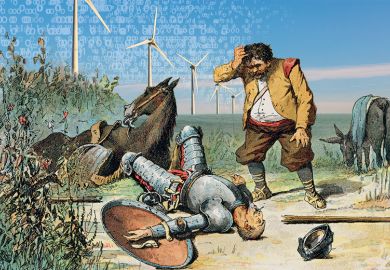Raphael Salkie finds lexicography is as much loved as shepherd's piepicsDr Johnson famously defined "lexicographer" as "a harmless drudge", but lexicographers can teach us a huge amount about language. These two books depict admirably these two sides of dictionary-making.
In 1926 a book appeared with the title A Dictionary of Modern English Usage , written by a reclusive former schoolteacher named Henry Fowler. The book became an instant bestseller, and in the next 75 years it went on to win the same sort of place in many English-speaking hearts as Charles Dickens, the BBC and shepherd's pie. Nor was the book Fowler's first success: in 1911 he and his younger brother Frank compiled the first Concise Oxford Dictionary , another household name. Since then, the name "Fowler" has become a byword for linguistic discernment and reliable advice about the difference between "continual" and "continuous", or the correct use of semicolons.
What was it about the man that made his guide to good English so popular? Jenny McMorris's biography takes us through Fowler's years as a teacher in a private school, where he was remembered with respect rather than affection. The author of Modern English Usage rebukes what he sees as bad writing: he denounces several fashionable French expressions as "abominations"; and after giving examples where authors use "was the recipient of" rather than "received", he storms: "Can any man say that sort of thing and retain a shred of self-respect?" Fowler was not a simple traditionalist. He resigned from teaching because his atheism conflicted with religious rituals at his school, and in his book he likewise rejected as "superstition" the belief that no sentence should ever end with a preposition. He wanted to help writers by freeing them from outdated and unhelpful restrictions. His work on the dictionary also taught him that English is constantly evolving, and that resisting change is usually futile. In a typical discussion of "talkative" in Modern English Usage , the conservative in Fowler started by lamenting the addition of a Latin suffix to a Germanic verb, but as a realist he went on to say that the word was "much too well established to be attacked". This mixture of thunderous scorn and realism, along with the quirkiness and shafts of humour, is what made his book so popular.
Fowler aimed to promote "brevity and lucidity", qualities that he had developed in his own writing while condensing the enormous amount of information from the massive Oxford English Dictionary into a handy form for the Oxford Concise . Fowler was a teacher, a freethinker, a dispassionate observer of language and a skilful writer himself, all of which gave him the expertise and the moral authority to dispense his advice forthrightly. McMorris has given us a readable and fitting picture of him in this book.
Sidney Landau is a lexicographer who has many of Fowler's good qualities, and his book elegantly distils the lessons of a lifetime spent wrestling with the meaning and use of English words. The first edition of 1984 was informative and a pleasure to read, but this new version is superb. It gives succinct sketches of all the important dictionaries of English from the earliest days up to now, on both sides of the Atlantic.
Landau discusses the different types of information in dictionaries, explaining how he and his colleagues collect the facts, analyse them and attempt to present them accurately and comprehensibly. He examines the way dictionaries deal with meaning and usage, and gives an enthusiastic but hard-headed account of how dictionaries have been improved by the use of computer corpora - large collections of authentic spoken and written language that can supply reliable data about how language is actually used. The process of putting together a dictionary is described in lucid detail, and Landau ends by discussing some of the ethical problems that lexicographers face.
The book is fascinating for several reasons, not least for the sheer amount of information it contains. Landau excels in showing how the scientific problems of writing dictionaries interact with the practical ones. A good example is his discussion of how to define the meaning of words. A good definition must be accurate, capturing the exact significance of a word without being too specific or too vague, and if a word has several different senses, these should be explained in a coherent way. At the same time there is immense pressure on lexicographers to be concise: partly because publishers want to keep costs down, but a more important factor is the desire not to swamp readers with irrelevant information. This means that dictionaries have to anticipate the information needs of users, which is what a teacher has to do. Lexicographers have to be thoughtful educators as well as careful scientists, in Landau's view. He argues that a dictionary is not just a repository of facts in alphabetical order, like a telephone directory, but that it should try to "enrich the understanding of the user", and I applaud him for taking this stance.
Dictionaries often arouse strong emotions and loyalties. Lexicographers try to describe language objectively, but they are aware that including a word in a dictionary is often taken as a seal of approval. They get caught up in controversies about accurate usage, for instance whether "refute" should only be used to mean "prove incorrect" (my dictionary notes that it is often used as a synonym of "deny", but that careful usage distinguishes the two words). Should dictionaries take as their starting point the written language of educated people, or should they include words and expressions used only in speech, or by particular social groups? My dictionary includes "spliff", "ganja", "skag" and the cannabis sense of "joint": is this endorsing drug misuse? Whatever lexicographers do, someone is sure to complain.
Landau argues that lexicography is morally neutral on traditional questions of correctness. The job of a dictionary is to indicate, as accurately as possible, that some words can cause offence, others are formal or literary, while others are relaxed and friendly. His neutrality is belied, however, by the seriousness that he brings to this task. Experienced lexicographers, he insists, have expertise that entitles them to hold strong opinions about language. They consult other experts for advice about technical and scientific terms, but they have a right to decide how best to present specialist information about these terms. They are skilled users of language, writing definitions that say an enormous amount in a few words and setting out the information about pronunciation, grammar, etymology and usage in a way that they judge to be clear and comprehensive. They must also, he cautions, beware conceit: almost any definition can be improved, and dictionary writers must expect editors to change their most cherished efforts before they are published. Good dictionaries are a mark of a civilised society, and these two books show us why. I hope that they are widely read.
Raphael Salkie is principal lecturer in language studies, University of Brighton.
The Warden of English: The Life of H.W.Fower
Author - Jenny McMorris
ISBN - 0 19 866254 8
Publisher - Oxford University Press
Price - £19.99
Pages - 242
Register to continue
Why register?
- Registration is free and only takes a moment
- Once registered, you can read 3 articles a month
- Sign up for our newsletter
Subscribe
Or subscribe for unlimited access to:
- Unlimited access to news, views, insights & reviews
- Digital editions
- Digital access to THE’s university and college rankings analysis
Already registered or a current subscriber? Login



